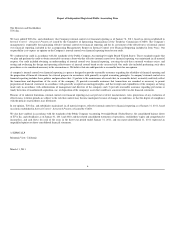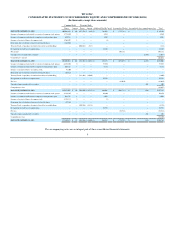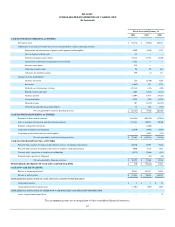TiVo 2010 Annual Report Download - page 16
Download and view the complete annual report
Please find page 16 of the 2010 TiVo annual report below. You can navigate through the pages in the report by either clicking on the pages listed below, or by using the keyword search tool below to find specific information within the annual report.
Beginning
Balance Charged
to
Revenue
Deductions
(*) Ending
Balance
(in thousands)
Allowance for expected product and service returns:
Fiscal year ended:
January 31, 2011 $ 1,174 $ 4,737 $ (4,189) $ 1,722
January 31, 2010 $ 965 $ 5,412 $ (5,203) $ 1,174
January 31, 2009 $ 2,193 $ 5,046 $ (6,274) $ 965
(*) Deductions related to the allowance for expected product and service returns represent amounts written off against the allowance.
Certain payments to retailers and distributors such as market development funds and revenue share are recorded as a reduction of hardware revenues
rather than as a sales and marketing expense. TiVo’s policy for revenue share payments is to reduce revenue when these payments are incurred and fixed or
determinable. TiVo’s policy for market development funds is to reduce revenue at the later of the date at which the related hardware revenue is recognized or
the date at which the market development program is offered. The Company also records rebates offered to consumers as a reduction of hardware revenue. In
the past, the Company adjusted its rebate liability periodically for changes in redemption rates, changes in duration and amounts of rebate programs and
channel inventory quantities subject to such changes. The Company terminated its rebate programs on August 30, 2008.
The Company sells the DVR and service directly to end-users through bundled sales programs through the TiVo website. Under these bundled programs,
the customer receives a DVR and commits to a minimum subscription period of one to three years or product lifetime and has the option to either pay a
monthly fee over the subscription term (monthly program) or to prepay the subscription fee in advance (prepaid program). After the initial committed
subscription term, the customers have various pricing options at which they can renew the subscription. The VOE of fair value of the subscription services is
established based on standalone sales of the service and varies by pricing plan. Under these bundled programs, revenue is allocated between hardware revenue
for the DVR and service revenue for the subscription using the residual value method, with the DVR revenue recognized upon delivery and the subscription
revenue being initially deferred and recognized over the term of the service commitment.
Stock-Based Compensation
The Company has equity incentive plans under which officers, employees, consultants, and non-employee directors may be granted options to purchase
shares of the Company’s authorized but unissued or reacquired common stock, and may also be granted restricted stock, performance based stock options and
other stock awards. Additionally the Company has an Employee Stock Purchase Plan (“ESPP”) which officers and employees can participate. Upon the
exercise of options, the Company issues new common stock from its authorized shares.
The fair value of TiVo’s restricted stock awards is calculated based on the fair market value of the Company’s stock at the grant date. The fair value of
TiVo’s stock options and ESPP awards is estimated using a Black-Scholes option valuation model. TiVo recognizes compensation expense for stock option
awards on a straight-line basis over the requisite service period of the award.
Advertising Costs
The Company expenses advertising costs related to its products and service as incurred. Marketing co-op development payments, where the Company
receives, or will receive, an identifiable benefit (goods or services) in exchange for the amount paid to its customer, and the Company can reasonably estimate
the fair value of the benefit it receives, are classified as marketing expense. For the fiscal years ended January 31, 2011, 2010, and 2009, this amount was
immaterial. All other marketing co-op development payments are classified as a reduction of hardware revenues. Advertising expenses were $3.8 million,
$1.6 million, and $2.5 million, of sales and marketing, subscription acquisition costs for the fiscal years ended January 31, 2011, 2010, and 2009, respectively.
Included in these advertising expenses are $3.2 million, $976,000, and $1.8 million, respectively, related to media placement costs.
Warranty Expense
The Company accrues for the expected material and labor costs required to provide warranty services on its
15
























